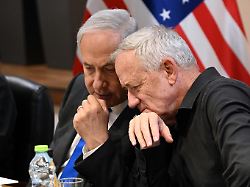Trouble in Israel’s war cabinet
Netanyahu’s rivals are seizing power
March 7, 2024, 5:06 p.m
Listen to article
This audio version was artificially generated. More info | Send feedback
In the middle of the Gaza war, the mood in the Israeli war cabinet is explosive. Former Prime Minister Gantz is openly positioning himself as Netanyahu’s successor. But party members are also contesting power for the ailing head of government.
In order to demonstrate Israel’s national unity in the war against the radical Islamic Hamas, important opposition forces sit in the war cabinet. But an open rivalry between Prime Minister Benjamin Netanyahu and cabinet member Benny Gantz, who belongs to the political center, is shaking the committee. A visit by former army chief and ex-defense minister Gantz to Washington and London this week, which was not approved by Netanyahu, highlighted the deep rift between the two politicians.
After Hamas’s unprecedented major attack on Israel on October 7, Gantz gave up his opposition role and joined Netanyahu’s war cabinet. The cabinet has five members: Netanyahu, Gantz and Defense Minister Joav Gallant are seen as the most important players. Gantz’s trip to the U.S. capital Washington drew much attention in Israel and sharp criticism from Netanyahu’s right-wing Likud party. “It looks like some kind of subversion,” said Transport Minister Miri Regev. Gantz “works behind the Prime Minister’s back.”
Political scientists also see it this way: Gantz’s visit to Israel’s closest ally, the USA, shows that “his trust in Netanyahu is at its lowest point,” says Johanan Plesner, president of the Israel Democracy Institute think tank. It also shows that Gantz wants to offer Washington an alternative perspective from Israel.
“Two who hate each other”
There have always been tensions between these two men “who hate each other,” says Reuven Hazan, professor of political science at the Hebrew University of Jerusalem. Gantz traveled to Washington and London to show that he had the right profile for a future head of government – and to prepare his exit from the war cabinet, which Hazan believes is inevitable. Gantz is currently ahead in the polls in Israel.
In Washington, Gantz met US Vice President Kamala Harris – a day after she sharply criticized Israel and called for an “immediate ceasefire”. She also expressed concern about the humanitarian situation in the Gaza Strip and made an unusually strong call on Netanyahu to allow more aid.
US President Joe Biden and Netanyahu are in an “open conflict,” says Hazan. The White House is putting pressure on the Israeli head of government not to continue as before in the Gaza Strip – “with massive civilian casualties in Gaza and without knowing what will happen after the war.” As far as the post-war period is concerned, Gantz is closer to the US position than Netanyahu. For Washington, he is a “more pleasant” interlocutor who is more open to “dialogue with moderate partners in the region” and about a possible role for the Palestinian Authority in the Gaza Strip after the war.
Defense Minister Gallant is also igniting
Last week, Gantz welcomed a proposal from Israeli Defense Minister Gallant to reform military service and expand it to include ultra-Orthodox Jews. So far, ultra-Orthodox Jews have been exempt from compulsory military service for religious reasons. Some Israeli media found that Gallant, who belongs to the same party as Netanyahu, is also challenging the head of government. It was a political blow that puts the head of government in a corner, as the two main parties representing the ultra-Orthodox could collapse Netanyahu’s fragile coalition at any time.
Netanyahu wants to prevent an early election at all costs, says Plesner. According to the poll, Gantz’s party would win the most seats in parliament if the vote were taken. “If there is one issue that could get out of hand and lead to the collapse of the coalition,” it is the possible recruitment of ultra-Orthodox, says Plesner.
Since the major Hamas attack on Israel, in which, according to Israeli information, around 1,160 people were killed and 250 others were kidnapped as hostages, the Israeli army has taken massive military action in the Gaza Strip. According to the latest Hamas figures, which cannot be independently verified, at least 30,800 people have been killed so far.
